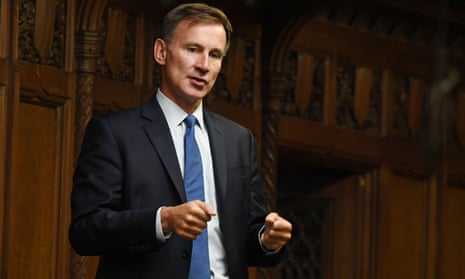The former health secretary Jeremy Hunt has urged Conservative backbenchers to back the government’s changes to social care funding, despite describing parts of the plan as “a really big disappointment” and “stingy”.
Hunt, who chairs the Commons health and social care select committee, told colleagues it was better to vote through the plans in parliament on Monday evening in the hope that governments will in future make them fairer for people with fewer assets.
The Department of Health and Social Care caused alarm on Thursday when it revealed it would calculate the £86,000 cap on lifetime care costs in a way that could leave tens of thousands of England’s poorest pensioners paying the same as wealthier people.
No 10 said it would not change course on the plans, set to be put the House of Commons on Monday evening, despite a sizeable backlash from Tory MPs.
“We will continue to listen to views put forward by people who are invested in this policy, but we continue to believe that this is a system that is necessary, fair and responsible,” Boris Johnson’s spokesperson said.
Downing Street said it could not fully guarantee that people may have to sell family homes to pay for care costs, saying it could not “predict individual situations”.
Several Tory backbenchers have indicated they will oppose the plan, including the former justice secretary Robert Buckland. People living in areas of the north and Midlands where house prices are lower will be hardest hit, threatening Tory support in “red wall” seats.
The Bury South MP, Christian Wakeford, said there was widespread concern about whether the plans were adequate. “To move the goalposts after we’ve already been introduced this, it’s not something I’m particularly comfortable with it,” he said.
“Especially when one of the main messages for introducing this levy [to pay for the policy] was: ‘You won’t need to sell your house for care’, to get to a point where unfortunately you might need to and [it’s] arguably our least well-off in society, our least well-off voters – again, it’s not something I’m particularly comfortable with,” he told Times Radio.
Hunt told a conference of council bosses on Monday: “It is very disappointing that the way the cap is going to be calculated is going to be changed, which means it is going to be a less-progressive measure than was hoped for and will help fewer people with lower asset levels than had previously been hoped for.
“But to people who are thinking about voting against the government, all I would say is that once this cap has been introduced at this current level it will be entirely open to governments in the future to change the way the cap is calculated to make it more progressive going forward. The really important thing is we have a cap, which we didn’t have before.”
The government is proposing a cap on care costs in England of £86,000, but said last week that council contributions to care fees would not go towards the cap, which means poorer people who get means-tested help would end up paying the same as richer people if they needed care for a significant amount of time. It would save the government £900m a year by 2027 but would leave many poorer homeowners exposed to “catastrophic costs” including the need to sell their homes, analysts have said.
Hunt said it was a “slightly more stingy cap” than had been hoped for, but it was “a step in the right direction”. However, he said he was “very worried” about near-term funding for social care, pointing out that the £1.8bn extra over the next three years announced in September was well short of the £7bn extra his committee of MPs believed was needed. He said social care was “very battered and bruised”.
Speaking at the same event, the care minister, Gillian Keegan, defended the changes to a currently “fundamentally unfair” system that did not cap care costs. She said it “will end those uncontrolled and catastrophic costs that some families endure”.
But on Monday a government minister was unable to guarantee that some people would not have to sell their homes despite an earlier promise that changes would protect against that.
The business minister Paul Scully told Sky News: “There will be fewer people selling their houses, and hopefully none.”
He said: “I can’t tell you what individuals are going to do. What I’m saying is the social care solution is all about getting a cap above which you do not need to pay – that gives people certainty.”
Sir Andrew Dilnot, the economist who drew up care cap proposals that were legislated for in 2014 but never implemented, said on Monday: “For those with assets of, say, less than £100,000, we are not tackling catastrophic costs … for the less well off, although we are for the better off.”
He has said that anyone with assets of below £186,000 could be less well off than expected if they needed old-age care – potentially affecting hundreds of thousands of people.
The shadow health secretary, Jonathan Ashworth, described the proposal as “daylight robbery”.
“If you live in a £1m house, perhaps in the home counties, 90% of your assets will be protected if you need social care, but if you live in a £80,000 terraced house in Hartlepool or Mansfield or Wigan, for example, you lose nearly everything,” said Ashworth. “That is not fair. That is not levelling up. That’s daylight robbery.”










